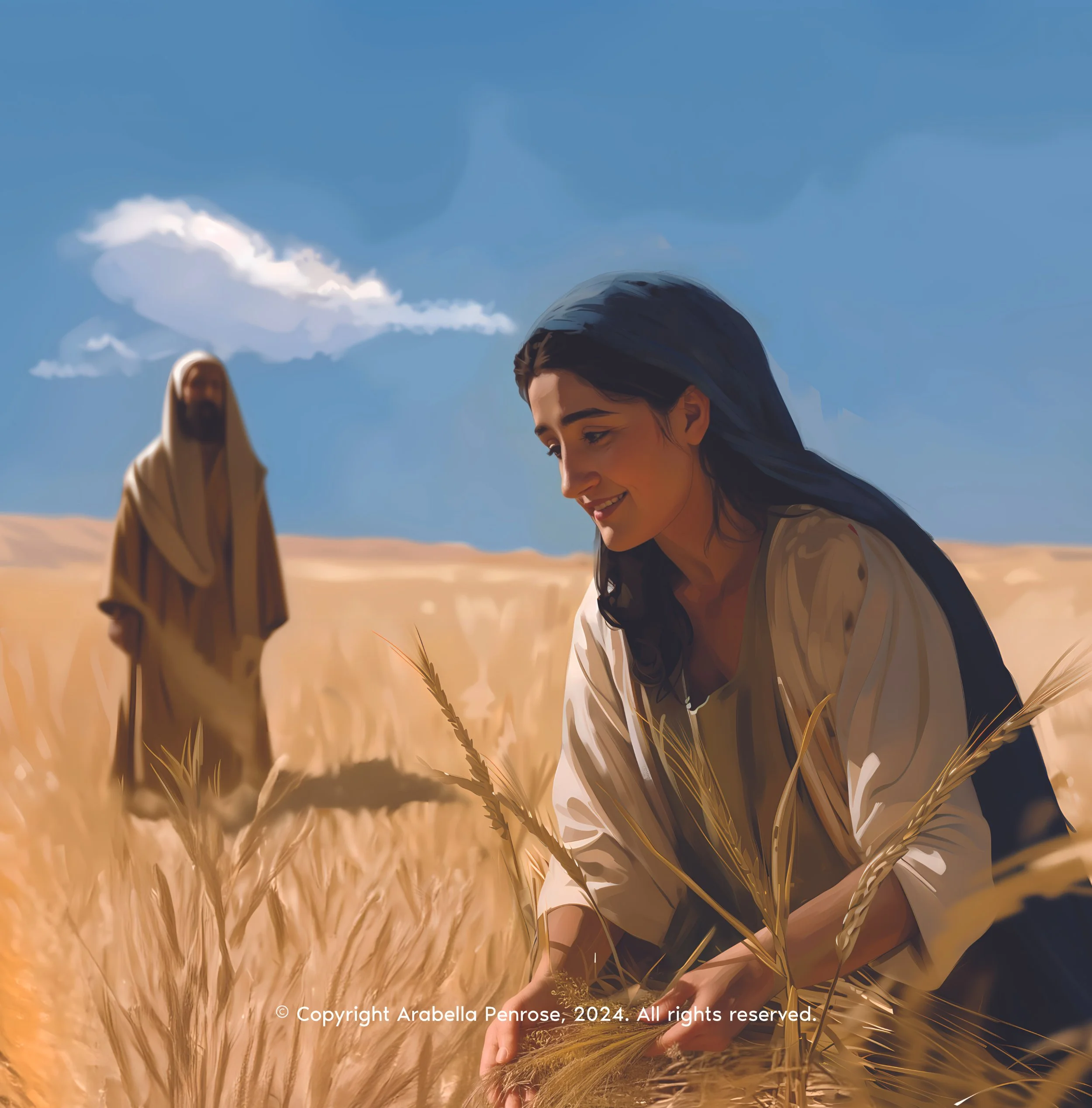Ruth the Moabitess: A Rejected Woman Redeemed into the Line of Christ
What would you do if God Himself had rejected people like you? No way in. No hope of acceptance. No place among the people of God, because of where you came from, because of what your ancestors had done?
That was the fate of the Moabites. According to Deuteronomy 23:3-6, the Moabites were cursed and excluded from the assembly of the Lord because of how they treated Israel during the exodus: refusing them bread and water and hiring Balaam to curse them. They were outsiders. The forgotten. The condemned.
And Ruth was a Moabitess.
Her identity wasn’t just a label, it was a barrier, a mark that should have kept her separate from God’s people forever. But when famine struck, and a desperate family from Bethlehem fled to Moab, the story took an unexpected turn. One of their sons married Ruth, a foreign woman with no claim on Israel’s God. And when death stripped everything away—husband, security, future—Ruth made a choice that went against all logic.
She chose Naomi. Chose Israel. Chose a God she barely knew but somehow believed was worth following.
It was a choice without guarantees. A step of faith into the unknown. But it was also the choice that would place her at the center of one of the most beautiful stories of redemption in all of Scripture.
A Rejected Lineage and a Risky Choice
It’s easy to quote Ruth’s words like a poetic vow: “Your people will be my people, and your God my God” (Ruth 1:16–17). But for Ruth, that declaration wasn’t just words. It was commitment. A decision made in the face of loss, with no husband, no protection, and no guarantees. Naomi had nothing to offer her. No home. No future. No reason for Ruth to come.
Except faith.
But not the kind of faith that stays comfortable. Ruth’s faith wasn’t theoretical—it moved her to action. It led her across unfamiliar terrain into a land where she had no legal rights and no cultural welcome. A widow from a rejected nation, clinging to another widow whose bitterness had turned her name to “Mara.” From a human perspective, it looked foolish. Even Naomi tried to talk her out of it.
But Ruth went anyway.
This wasn’t a romanticized moment of spiritual inspiration. It was the beginning of a long journey into an uncertain future. Her very identity marked her as an outsider, a constant reminder of Moab’s betrayal and the curses etched into Israel’s memory.
Ruth in Bethlehem: A Dangerous Place for an Outsider
Bethlehem was home to Naomi, but for Ruth it was foreign ground. She would have known the risks. A Moabite woman, young, widowed, childless, arriving in a town that knew God’s law about the Moabites. Her presence wasn’t just unfamiliar; it was a reminder of Israel’s wounds.
There’s no record of violence or open rejection, but Ruth would have known she didn’t belong. She went straight to the fields to gather leftover grain, a legal right for the poor (Leviticus 19:9–10), but that didn’t mean she would be safe. The fact that Boaz had to warn his men not to touch her (Ruth 2:8–9) tells you everything you need to know. She was vulnerable. Exposed. The kind of woman who could be harmed without consequence.
But she showed up day after day, working under the sun with no promise of favor, no certainty of welcome. And in that place of humility and faith, she caught the attention of someone who saw more than where she came from.
The Grace of Boaz: An Unlikely Redeemer
Boaz saw Ruth’s quiet faith and loyalty to Naomi. While she bent low in the fields, gathering scattered heads of grain, he noticed her hard work and determination. And when he learned she was the Moabite woman who had left everything to stand beside Naomi, he chose to protect her.
“Stay in my fields,” he told her. “I have ordered the young men not to touch you.” (Ruth 2:8–9). These weren’t just words of kindness, they were a shield. Boaz offered Ruth a place of safety in a world where she had every reason to fear.
Later, when Ruth approached him while he slept on the threshing floor, a vulnerable act of trust, Boaz did not take advantage. Instead, he honored her courage and became her redeemer.
Redemption wasn’t just affection, it was a legal, sacrificial act. Boaz took on her debts, her risks, her future. In a world where Ruth should have been excluded, she was chosen.
When God Turns Curses into Promises
Ruth’s redemption didn’t just change her future—it rewrote her story. A woman from a rejected nation became the great-grandmother of King David (Ruth 4:13–17). Her name became part of the royal lineage of Christ (Matthew 1:5). The curse of Moab was real, but God’s power was greater.
This wasn’t a twist of fate. It was a revelation of God’s character, a God who doesn’t just cancel sin but transforms it. A God who takes the excluded and makes them essential. A God who writes redemption into stories marked for rejection.
If you’ve ever felt disqualified, if you’ve ever wondered if your past is too dark or your heritage too tangled for God to accept you, hear this: Ruth’s story is proof that God’s love is stronger than any curse. And His embrace is wider than any wall meant to keep you out.
You aren’t just an outsider. In Him, you become an heir.
If you’d like to inspire your children with Ruth’s redemption story, check out my book, Ruth the Moabitess: A Rhyming Bible Story of Kindness, Loyalty, and Diligence.





